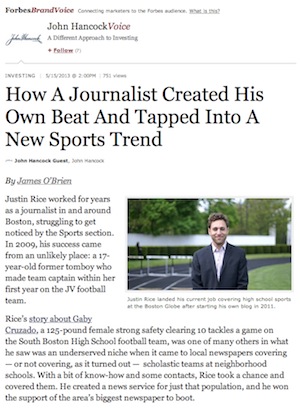 This piece at Forbes about Boston journalist Justin Rice is interesting for a few reasons:
This piece at Forbes about Boston journalist Justin Rice is interesting for a few reasons:
— It describes how Justin, a few years back, started an independent, no-revenue site called BPSsports that covered high school sports in the urban Boston public schools — something local media wasn’t particularly interested in covering. After building it up, it was scooped up by The Boston Globe, where it lives on as BPS Sports Blog at Boston.com, with Justin still serving as lead writer. It’s a nice example of the value of just starting something and of the opportunities that can open up.
Rice didn’t approach his innovative gig by knocking on doors in a traditional way. He nabbed it by doing the work of BPSsports himself, at first, creating a proof of concept that eventually paid off. He showcased the potential. He eventually reaped the rewards. In that, there’s a time-tested entrepreneurial tradition, but there’s also a takeaway specifically for writers looking to make their own beat, especially in an age of digital news.
“Just jump in and don’t hesitate,” Rice said. “If you truly want to occupy a new niche, then you’ve got to claim that niche as quickly as possible, before anyone else does. Throw up what you can, do as much as you can with it. If it truly is a niche, somebody else is going to be interested.”
— We know Justin around here — he wrote a four-part series for Nieman Lab on the impact of sports networks becoming their own media outlets way back in 2009.
— The story isn’t actually straight Forbes journalism — it’s part of its Forbes BrandVoice program that lets brands “post interesting and relevant content on Forbes.com while tapping into the social web through Forbes’ powerful, search optimized publishing platform.” So this piece was presented by…John Hancock, which I guess wants you to think of it whenever you think of urban high school sports? (James O’Brien is listed as the author.)
This is the happiest sort of sponsored content — the story has nothing to do with John Hancock and has seemingly no attachment to John Hancock’s business interests. (You don’t see that on all of John Hancock’s sponsored Forbes content — like a story about the wonders of homeownership or one about why you should “check in with your financial advisor at least once a year” about your 401(k).)
We hear about it when sponsored content goes wrong, and there are plenty of landmines that need navigating. But it’s also worth noting when sponsored content checks in as somewhere between “inoffensive” and “nice.”
Leave a comment